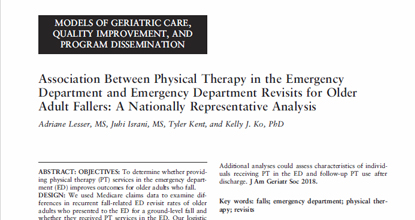Abstract
Objectives
To determine whether providing physical therapy (PT) services in the emergency department (ED) improves outcomes for older adults who fall.
Design
We used Medicare claims data to examine differences in recurrent fall‐related ED revisit rates of older adults who presented to the ED for a ground‐level fall and whether they received PT services in the ED. Our logistic regression model controlled for age, sex, Medicaid eligibility, acute injury, and certain known chronic comorbidities associated with risk of falling.
Setting
We analyzed national 2012–13 Medicare claims data for individuals aged 65 and older.
Participants
This was a claims‐based analysis. We defined an index visit as any ED claim that included an International Classification of Diseases, Ninth Revision, Clinical Modification E‐Code indicating a ground‐level fall. Visits resulting in admission were excluded, as were claims associated with an individual who died during follow‐up; 17,975 of the 560,277 claims for eligible outpatient index visits included revenue center codes for PT services.
Measurements
We calculated the proportion of index visits associated with a fall‐related ED revisit within 30 and 60 days and assessed differences in these proportions between individuals who did and did not receive PT services in the ED.
Results
Receiving PT services in the ED during an index visit for a ground‐level fall was associated with a significantly lower likelihood of a fall‐related ED revisit within 30 days (odds ratio (OR)=0.655, p<.001) and 60 days (OR=0.684, p<.001).
Conclusion
Expanding PT services in the ED may reduce future fall‐related ED use of older adults. Additional analyses could assess characteristics of individuals receiving PT in the ED and follow‐up PT use after discharge.



